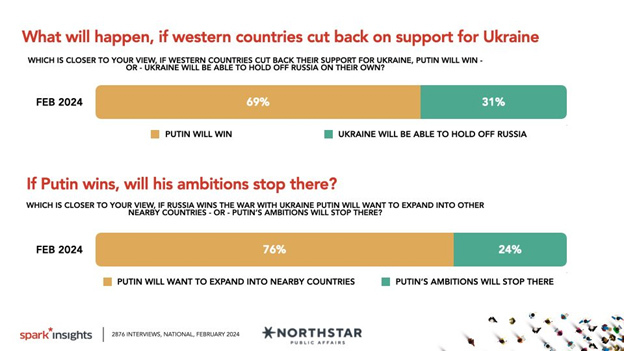We are now two years into the conflict in Ukraine. Throughout this period, Canadians and their political leaders have been united in their support for Ukraine, democracy, the rule of law and a rules-based world order. Yet, beneath the surface of consensus, cracks in our collective resolve are beginning to emerge. We are entering a critical period in Canadian foreign policy and the need for continued moral leadership has never been greater.
In collaboration with NorthStar Public Affairs, spark*insights surveyed 2,876 Canadians. The study revealed that Canadians were largely united in their view of Russia’s illegal invasion of Ukraine and Canada’s role within it. A significant majority of Canadians understand the stakes of reducing support for Ukraine. Over two-thirds (69%) believe that if the West were to cut back its aid, it would greatly increase the likelihood of a victory for Putin. This sentiment crosses party lines, though it's notably stronger among Liberal (75%) and NDP (73%) voters, compared to their Conservative counterparts (66%).

The consequences of a Russian victory extend far beyond the borders of Ukraine. An overwhelming 76% of respondents fear that such an outcome would only embolden Putin's expansionist ambitions, threatening the stability and sovereignty of other nations in Eastern Europe. Again, this concern is more pronounced among Liberal and NDP voters but remains significant across the political spectrum.
At the heart of this discussion is Canada's role on the global stage. Should we, as a country, distance ourselves from the conflict, deeming it a battle in a far away land, irrelevant to the daily lives of Canadians? Or do we stand with our allies, recognizing that the fight for Ukrainian sovereignty is intrinsically linked to our own security and values? The answer from Canadians is clear, with two-thirds (69%) advocating for active and continued support against Russian aggression. This is a call that transcends political affiliations, demanding a unified response to a global threat.
However, the trend of growing isolationism, particularly amongst Conservative voters, is noticeable. This mirrors trends in Conservative parties around the western world, especially in the United States. The good news is that the majority of Conservative voters here in Canada remain committed to supporting our allies in Europe.
The data clearly show that Conservative leader Pierre Poillievre need not be too bothered by those within his voter base that prefer a more isolationist path. Overwhelmingly, and simply put, most Conservative voters know that being on the right side of history is what is at stake.
Supporting Ukraine is more than a policy decision; it is a declaration of our values, a commitment to the rule of law, human rights, and the international order that has served us well since the Second World War. It also recognizes that, like Ukraine, Canada, as a smaller nation, has the right to choose its own path, free from the shadow of more powerful countries.
Our collective memory of history reminds us that ignoring aggression only emboldens tyrants and endangers the vulnerable. It has often been said that “the only thing necessary for the triumph of evil is for good men to do nothing”. This rings truer now than ever as the world continues to bear witness to the thug tactics of Putin. Today, in Ukraine, there are many good men and women doing a great deal to hold the line for democracy, the rule of law, and human rights.
Putin cannot be appeased. He must be opposed.
While the recent rise of isolationism within conservative circles is concerning, the modern Party has had a strong record of support for Ukraine and its people. The Conservative Party under Stephen Harper negotiated the original Free Trade Agreement with Ukraine. Harper notably took a firm stand against Putin, directly warning him to stay out of Ukraine. Most recently, Pierre Poilievre demonstrated his support by attributing the death of Russian opposition leader Alexei Navalny to Putin.
There is plenty for politicians here in Canada to debate and disagree with – support for Ukraine need not be added to the pile. For partisans of all stripes the polling makes it clear. Support for Ukraine is not a partisan or divisive issue in our country. It is a moral choice shared by the majority of Canadians across the country. Politicians, regardless of stripe, can rest assured that if they support Ukraine, the vast majority of Canadians will support them.
Slava Ukraini!

Adam Taylor is a Partner at NorthStar Public Affairs, is a former senior advisor to a Conservative Minister of Foreign Affairs, and to a former Minister of International Trade.
Greg MacNeil is a Partner at NorthStar Public Affairs, is a former Liberal political staffer, and has spent the last seven years working in Canada’s defence sector.

